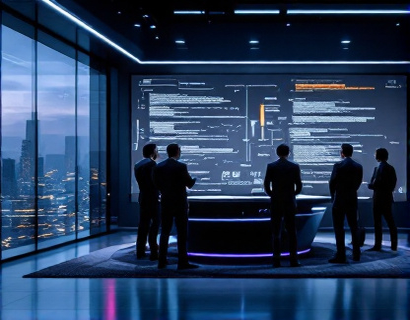AI-Driven Marketing Agents: Revolutionizing Business Growth Through Intelligent Automation
In the rapidly evolving landscape of digital marketing, businesses are constantly seeking innovative solutions to streamline their efforts, enhance customer engagement, and maximize return on investment. One of the most promising advancements in this domain is the emergence of AI-driven marketing agents. These intelligent tools leverage cutting-edge artificial intelligence technology to automate and optimize marketing strategies, allowing businesses to focus on their core activities with greater confidence. This article delves into the transformative impact of AI-driven marketing agents, exploring how they are reshaping the marketing landscape and driving substantial business growth.
The Role of AI in Modern Marketing
Artificial intelligence has become an indispensable asset in the marketing world. Unlike traditional marketing methods that rely heavily on human intuition and manual effort, AI-driven marketing agents can process vast amounts of data, identify patterns, and make data-driven decisions in real-time. This capability is crucial in a digital environment where consumer behavior is constantly changing and market conditions are highly dynamic. AI agents can adapt quickly to these changes, ensuring that marketing strategies remain effective and relevant.
One of the primary advantages of AI-driven marketing agents is their ability to automate routine tasks. From social media management to email marketing and content creation, these agents can handle a wide range of marketing activities with precision and efficiency. By automating these tasks, businesses can significantly reduce operational costs and free up valuable time for their marketing teams to focus on strategic initiatives that drive growth and innovation.
Enhancing Customer Engagement
Customer engagement is a critical component of successful marketing. AI-driven marketing agents excel in this area by providing personalized and contextually relevant interactions with potential and existing customers. Through advanced analytics and machine learning algorithms, these agents can analyze customer data to understand preferences, behaviors, and pain points. This insight enables the creation of highly targeted marketing campaigns that resonate with the audience, leading to higher engagement rates and better conversion outcomes.
For instance, AI agents can dynamically adjust content based on user interactions, ensuring that each customer receives a tailored experience. Chatbots powered by AI can provide instant responses to customer inquiries, offering support 24/7 and enhancing the overall customer journey. By maintaining a consistent and engaging presence, businesses can build stronger relationships with their customers, fostering loyalty and advocacy.
Optimizing Marketing Strategies
One of the most significant benefits of AI-driven marketing agents is their ability to optimize marketing strategies continuously. Traditional marketing approaches often rely on periodic reviews and manual adjustments, which can be time-consuming and less effective in fast-paced markets. AI agents, on the other hand, can monitor performance metrics in real-time and make data-driven adjustments to campaigns on the fly. This continuous optimization ensures that marketing efforts are always aligned with the most effective strategies, maximizing ROI and driving sustainable growth.
For example, AI agents can analyze the performance of different ad creatives, targeting options, and messaging to identify the most successful combinations. They can also predict future trends and adjust strategies proactively, staying ahead of the competition. This level of precision and adaptability is invaluable in a market where the slightest edge can make a significant difference.
Driving Substantial Business Expansion
The integration of AI-driven marketing agents into a business's marketing strategy can lead to substantial expansion. By automating routine tasks and optimizing campaigns, businesses can achieve higher efficiency and better results, allowing them to scale their operations with confidence. The time and resources saved through automation can be redirected towards exploring new markets, developing innovative products, and enhancing customer experiences.
Moreover, AI agents can help businesses identify new opportunities by analyzing market data and consumer insights. These agents can uncover untapped segments, forecast market trends, and suggest strategic initiatives to capitalize on emerging opportunities. This forward-looking approach enables businesses to stay competitive and relevant, even in highly saturated markets.
Case Studies and Real-World Applications
To better understand the impact of AI-driven marketing agents, let's examine a few real-world applications. A leading e-commerce company implemented an AI-powered marketing agent to manage its social media presence. The agent analyzed customer interactions, optimized post schedules, and curated content based on real-time data. As a result, the company saw a 40% increase in engagement and a 25% boost in sales within six months. The agent's ability to provide timely and relevant content significantly enhanced customer engagement and drove substantial revenue growth.
Another example is a B2B software firm that used an AI-driven marketing agent to streamline its lead generation process. The agent automated email campaigns, personalized outreach messages, and followed up with leads based on their behavior. This led to a 30% increase in lead conversion rates and a 50% reduction in sales cycle length. The firm was able to close more deals faster, directly contributing to its business expansion.
Challenges and Considerations
While the benefits of AI-driven marketing agents are clear, it's essential to acknowledge the challenges and considerations involved in their implementation. One of the primary concerns is data privacy and security. AI agents require access to vast amounts of customer data to function effectively, which raises questions about data protection and compliance with regulations such as GDPR. Businesses must ensure that their AI solutions adhere to strict data governance standards to maintain customer trust and avoid legal issues.
Another challenge is the initial investment required to integrate AI agents into existing marketing infrastructure. While the long-term benefits are significant, the upfront costs can be a barrier for some businesses. However, the return on investment is often substantial, with many companies seeing a quick payback period due to increased efficiency and better results.
Future Trends in AI-Driven Marketing
The future of AI-driven marketing is promising, with ongoing advancements expected to further enhance the capabilities of these agents. One emerging trend is the integration of natural language processing (NLP) and sentiment analysis to create even more personalized and empathetic customer interactions. AI agents will become more adept at understanding and responding to the emotional nuances of customer communications, leading to deeper connections and higher satisfaction rates.
Additionally, the rise of voice search and conversational interfaces will play a significant role in shaping the future of AI-driven marketing. As more consumers interact with brands through voice assistants and chatbots, AI agents will need to adapt to these new channels, providing seamless and natural experiences. This evolution will require continuous innovation and adaptation, but the potential rewards are immense.
Conclusion
AI-driven marketing agents represent a transformative force in the world of business marketing. By automating routine tasks, enhancing customer engagement, and optimizing strategies, these intelligent tools enable businesses to achieve greater efficiency, better results, and substantial growth. As the technology continues to evolve, the potential for AI-driven marketing to revolutionize the industry is limitless. Embracing these advancements can provide businesses with a competitive edge, allowing them to thrive in an increasingly digital and dynamic market.










































